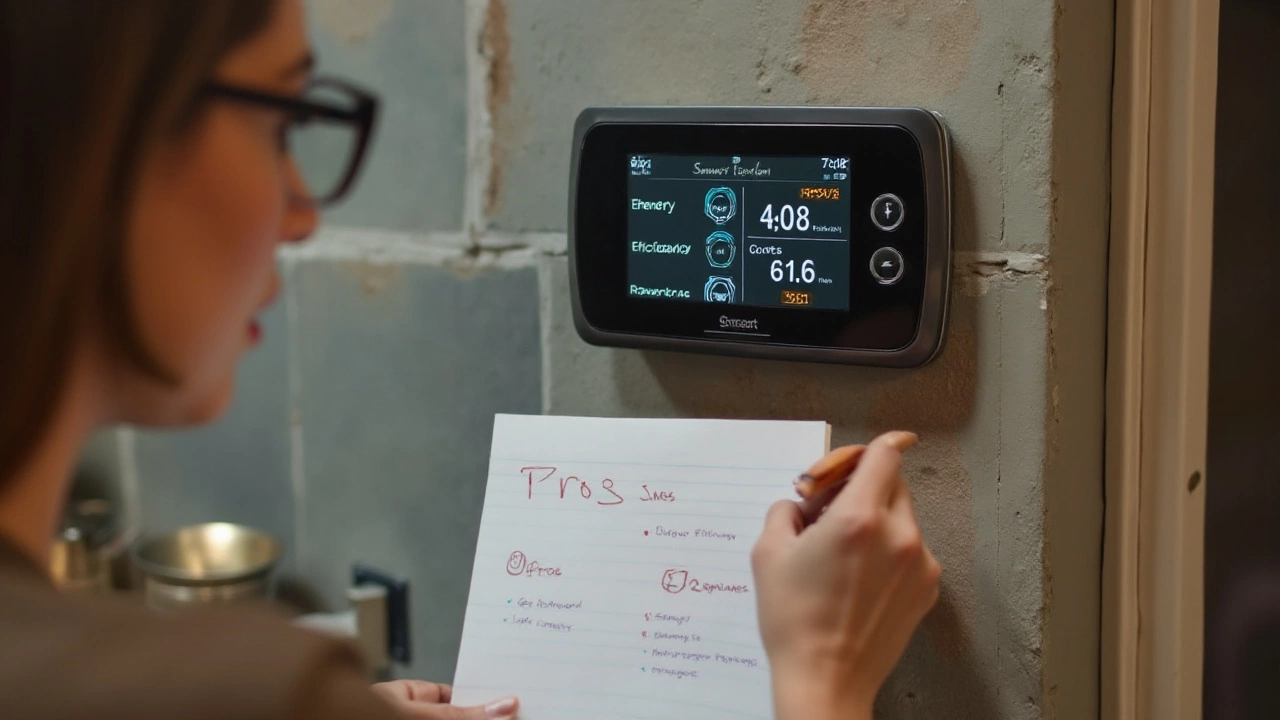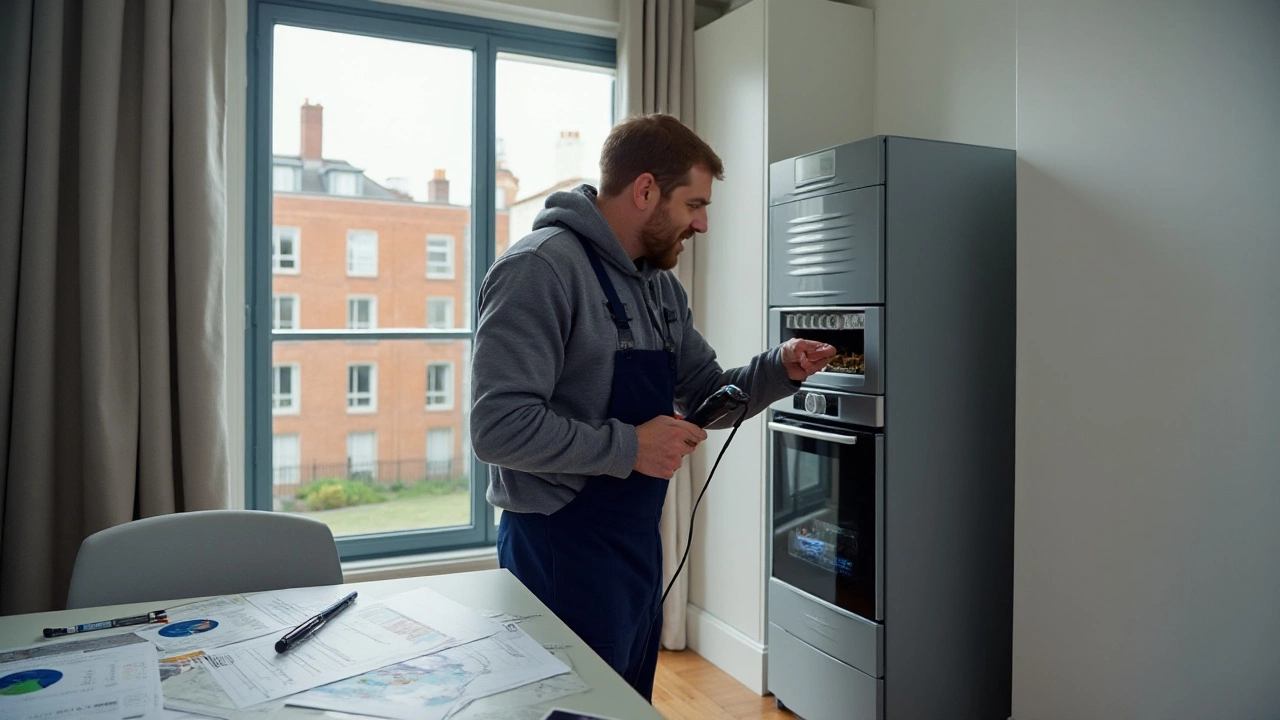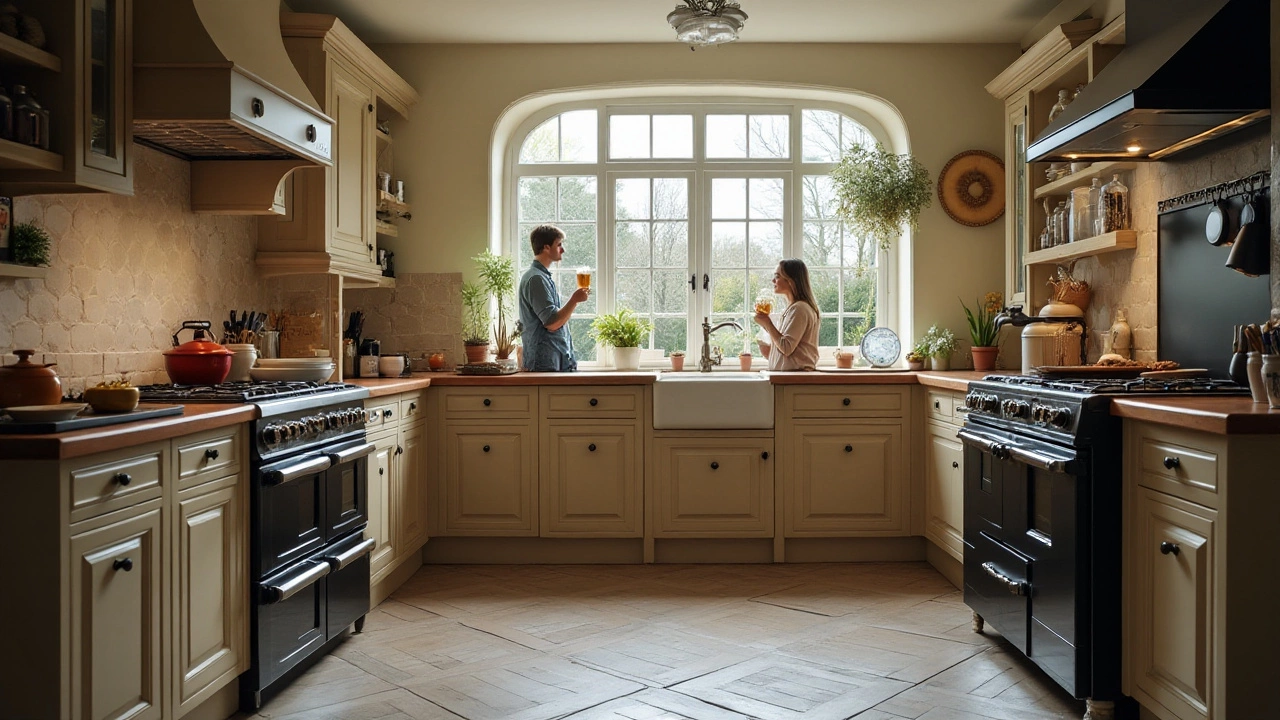It's 2025, and the world has become more conscious of energy usage than ever before. You might find yourself thinking about those trusty gas appliances in your home. Should they stay or should they go? This isn't a decision to rush. It's not just about costs or if they still work without hassle. Energy efficiency, safety, how they impact the environment, and the trends in modern living all play a role.
As we navigate these considerations, it's important to address the often-overlooked benefits and potential shortcomings of sticking with gas appliances. So let's dive in and explore what makes the most sense for you and your household. After all, having a reliable guide could mean the difference between a home that thrives and one that just gets by.
- Understanding Gas Appliance Efficiency
- Safety Concerns and Considerations
- Eco-Friendly Innovations and Options
- Repair or Replace: Making the Decision
Understanding Gas Appliance Efficiency
When it comes to finding the perfect balance between maintaining comfort and reducing expenses, understanding the efficiency of your gas appliances is paramount. After all, behind the warmth of your stove or the soothing hum of your heater lies the bigger picture of energy consumption. Households today are starting to take note of how much these units consume and what that means for energy bills. It's no wonder that efficiency has moved to the forefront of discussions regarding home appliances. Many gas models are built for high efficiency, but diving deeper into their ratings and technologies can paint a clearer picture of what you’re really getting.
First, understanding the efficiency of gas units often starts with the Annual Fuel Utilization Efficiency (AFUE) rating. This number, a percentage, equips homeowners with insights into how effectively a gas appliance converts energy from its fuel majorly into usable heat rather than waste. Modern heaters, for example, boast AFUE ratings as high as 98.5%, which means minimal energy wastage. Compare this to older models whose ratings might hover around 70%, and the benefits of investing in newer, efficient models become strikingly clear. Additionally, regularly cleaning and maintaining appliances can help maintain these efficiency standards over time.
There’s more to consider beyond these ratings, though. Each appliance, from your stove to your water heater, plays a unique part in your household's energy narrative. Think about your daily usage patterns; the gas range you use every evening might consume more energy than the furnace you turn on only in winter months. And while many users appreciate the convenience and cooking quality that gas stoves offer, energy conservation tipsters argue that electrics can sometimes serve as a more efficient substitute. The choice can come down primarily to personal preferences, but knowing how long and how hard you push these appliances can carve out potential pathways for savings or splurges.
Technological advances are also morphing how we think about home efficiency. With smart meters becoming mainstream, monitoring and adjusting daily consumption practices are no longer tasks confined to energy experts. By using smart thermostats, homeowners can now program gas heaters to operate only when needed, reducing waste and saving on bills. Likewise, the marketplace continues to usher in more eco-friendly appliances that promise lower emissions and better efficiency. Notably, the gas appliance sector is feeling the tug of eco-innovations, ushering in gas units that prioritize both performance and planet care. It's an ever-growing area that can reshape how we view appliances traditionally seen as energy gulpers.
One can't help but wonder about the broader implications for energy consumption, especially as we witness a shift in user behavior and mindsets towards sustainable living. There's even talk of future initiatives that propose more incentives for households switching to higher efficiency gas models, or those integrating renewables like solar thermal into their heating systems to further cut down on gas usage. Such measures could very well present enticing benefits for both the individual homeowner and the environment. The way people interact with their gas appliances could, in a few short years, look entirely different than it does now.
In a 2023 report by the International Energy Agency, it was found that improving the efficiency of residential gas appliances can lead to a 10% reduction in greenhouse gas emissions globally. This enlightening fact emphasizes the relevance of understanding gas appliance efficiency as not only a step towards financial thrift but as a crucial component in our collective journey toward tackling climate change. It's evident that these appliances, while often seen as mere fixtures, play a vital role in the bigger tapestry of our lives, affecting both personal comfort and the shared environment we call home.

Safety Concerns and Considerations
When it comes to using gas appliances, safety is a primary consideration that should never be taken lightly. These appliances, while incredibly useful and integral to the modern home, carry inherent risks if not properly maintained and monitored. Gas leaks, for instance, are one of those silent dangers that could easily escalate into life-threatening situations. An undetected gas leak can lead to suffocation, fires, or explosions. To ensure the safety of your household, it's crucial to have regular inspections performed by certified professionals who can detect potential issues before they become serious hazards. Furthermore, knowing how to detect the signs of a leak, such as the 'rotten egg' smell of sulfur, can make the difference between safety and disaster.
Proper ventilation is another aspect of safety one must keep in mind. Without appropriate ventilation, carbon monoxide — a deadly, odorless gas — could build up in confined spaces. This can happen if appliances are not installed correctly or if ventilation systems are blocked or damaged. Ensuring that all ventilation paths are clear and functioning can safeguard your family from carbon monoxide poisoning, which claims lives each year. In some places, it's legally required to have carbon monoxide detectors installed in homes with gas appliances. These detectors can provide an early warning, allowing homeowners to take swift action.
Interestingly, a report from the National Fire Protection Association highlighted that fires involving heating equipment, most notably ovens and stoves, account for nearly 15% of home fires each year. This statistic underscores the importance of routine maintenance and the need to keep appliances clean and free from grease build-up. Many fires start because of unattended cooking or flammable items left too close to flames. Routine cleaning and vigilance when cooking can mitigate these risks significantly.
Another key consideration should be understanding the lifespan of your gas appliances. Different appliances have varied lifespans, and, after a certain number of years, they could become less efficient and more dangerous due to wear and tear. Regular maintenance can extend this life expectancy, but sooner or later, components may fail unexpectedly. Understanding when to repair or replace your gas appliances is crucial in ensuring safety. For older appliances, one could argue it's wiser to opt for a replacement to benefit from modern safety features.
The installation process itself requires significant attention. Improper installation might void warranties and create safety hazards. Hiring a certified professional ensures that the appliance is installed per local regulations and manufacturer's instructions, keeping your warranty intact. A DIY approach, though tempting for those confident in their skills, might overlook essential safety elements.
"Safety should not be an afterthought but a core principle when it comes to gas appliance usage," says James Alder, a safety expert known for his contributions in Consumer Safety Digest.In a time when efficiency seems to rule, overlooking safety to save time or cost could yield dire consequences. Thus, while evaluating whether to retain or replace those trusty old gas appliances, prioritize safety as paramount to your decision-making process, ensuring peace of mind for you and your loved ones.

Eco-Friendly Innovations and Options
The discussion about embracing eco-friendly alternatives isn't just a trend; it's a direction influenced by the pressing need to reduce our carbon footprint. Gas appliances, although rooted in established technologies, have begun to see remarkable enhancements, aiming to sync with a sustainable future. One innovation to consider is the shift toward hybrid gas-electric models. These appliances cleverly use a combination of natural gas and electricity to perform efficiently while consuming less overall energy, making them both environmentally responsible and cost-effective in terms of long-term utility bills.
Another notable advancement is in the development of smart technologies integrated with gas appliances. These smart features are designed to automatically adjust settings based on usage patterns, ensuring optimal performance with minimal waste. Imagine a smart water heater that only heats water when you actually need it, significantly cutting down on energy usage. These smart systems often tie into home management apps, providing homeowners with real-time analytics. This data not only helps you understand your appliance usage but also offers insights into how one might further reduce energy consumption. It's an era where sustainability meets technology in truly remarkable ways.
However, upgrading to these modern solutions isn't without its considerations. A primary focus is the initial investment cost, which can be a sticking point for many homeowners. Manufacturers and governments have begun addressing this barrier by introducing incentives and rebates for eco-friendly appliance upgrades. In some states, depending on your location, you may qualify for substantial rebates or credits when you purchase approved energy-efficient models, lessening the financial burden of the switch. Home efficiency becomes accessible as these eco-friendly models not only provide substantial savings over time but also enhance the value of your home.
There's also an important dialogue about the use of renewable biogas as an alternative energy source to power gas appliances. Created from organic waste, biogas offers a renewable option that significantly reduces carbon emissions compared to conventional natural gas. While biogas is still gaining traction, trends show promising growth in its adoption, especially in regions aiming for aggressive sustainability targets. An interesting fact is that one cow's manure can potentially power a household stove for approximately three hours daily, underscoring the potential of this innovation. Deciding whether to explore this evolving market could have significant long-term environmental benefits.
Choosing environmentally conscious options doesn't only pertain to the appliances themselves. Installation and regular maintenance play crucial roles in maximizing the home efficiency of these systems. A study published in the Journal of Cleaner Production highlighted that proper maintenance and servicing could extend the lifespan of appliances by up to 40%, concurrently maintaining their optimal energy efficiency throughout their usage. Enlisting certified technicians who comprehend the intricacies of these advanced systems becomes more crucial than ever, securing eco-friendly benefits while ensuring safety remains paramount in this transitional phase.

Repair or Replace: Making the Decision
When it comes to determining whether you should repair or replace your gas appliances, it's not merely a matter of preference or inconvenience. The decision involves an intricate balance of factors that touch upon cost, safety, and efficiency. To begin with, assessing the age of your appliance can offer some guidance. Appliances over a decade old may be prime candidates for replacement due to the technological advancements that have occurred since their manufacture. These newer models aren't just about swanky designs; they offer improved energy efficiency, which can significantly lower your utility bills over time.
Next on the list is safety. Older gas appliances tend to have outdated safety features, making them more prone to risks such as gas leaks or inefficient combustion. An annual inspection by a certified technician is vital, but if your technician frequently identifies repairs, it might be time to weigh the benefits of securing a new, safer model. Some families choose to replace at the first sign of trouble, opting for peace of mind with every turn of the dial or push of a button.
Not to be overlooked are the economic and environmental impacts. A detailed evaluation of repair costs versus replacement is essential. If a repair is going to set you back more than half the cost of buying new, it might be time to consider replacements. According to the U.S. Department of Energy, natural gas appliances tend to release about 50% less CO2 than electric options. However, opting for the latest gas appliance models, which likely feature advanced eco-friendly innovations, can further reduce your household's carbon footprint.
According to Jane Harrington, a leading home efficiency expert, "It isn't just an appliance upgrade; it's a long-term investment in your home's value and the planet's health."Repairing might seem like a quick fix, but over time, those repair bills add up—often beyond the point of a reasonable financial decision. The newer models may have features you hadn't previously considered, from smart technology integrations to better fuel efficiency. Staying informed about replacement options gives you the power of choice, ensuring your home remains both functional and environmentally conscious. Don’t let sentimentality cloud your judgment; assess each option with a clear, objective lens for the best outcome.


